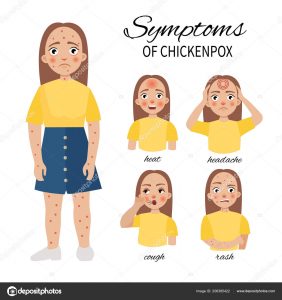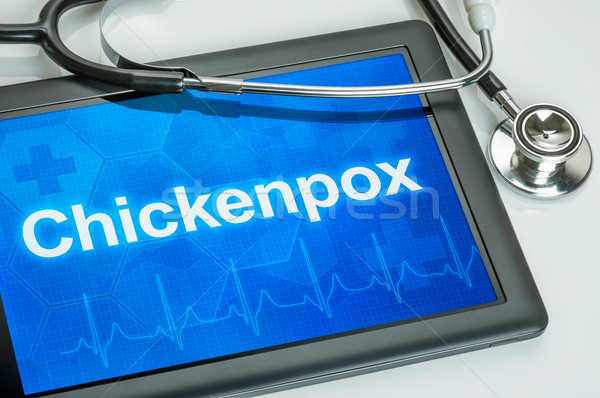Chickenpox is a highly contagious disease caused by varicella-zoster virus. 90% of cases of the infection happen in children especially those below the age of 2 years; though, older children and adults can get it too. It is characterized with very itchy rash which contains blister. Fever, body pain, loss of appetite and irritation can be present as well. Once infected, the infection will stay in your body for around 10-21 days before the rash and other symptoms develop. If you have the infection in your body, you’ll start becoming contagious to those around you about 48hours before the rashes appear in your body.

Symptoms of chickenpox. A girl with chickenpox.
The rash passes through three phases:
- Rashes develop like bumps all over the body
- The bumps become blisters filled with fluid that leaks
- The bumps become crusty, scab over and begin to heal.
In about 2 weeks, most people recover. The infection is mostly mild except in severe cases where blisters can spread to your nose, mouth, eyes and even genitals.
HOW DOES THE INFECTION SPREAD?
One can easily get the virus by inhaling the particles that come from chickenpox blister or by touching something on which the particles landed.
TREATMENT
There is no cure for chickenpox but can be prevented by vaccine. Prescription from your doctor is to reduce symptoms and how to prevent the infection from spreading to other people.
- Paracetamol (acetaminophen) may help with symptoms of fever and pain. Aspirin containing drugs should NOT be used because this can cause serious complications. Do NOT give ibuprofen and other NSAIDs in chickenpox as this can make the symptoms worse and cause serious skin problem.
- Drink plenty of water to prevent dehydration.
- Apply calamine lotion to reduce itching.
Antiviral (acyclovir) may be prescribed for pregnant women, adults, children and those with weakened immune system. This drug works best if it is given within 24hours of developing symptoms. The drug only reduces the severity of symptoms but does not cure the disease.
PREVENTION
The best way to prevent chickenpox is to get the chickenpox vaccine. Everyone – including children, adolescents, and adults – should get two doses of chickenpox vaccine if they have never had chickenpox or were never vaccinated.
Children who’ve never had chickenpox should get two doses of the vaccine — the first at 12 to 15 months of age, and the second between ages 4 and 6. People over age 13 who’ve never been vaccinated should get two doses of the vaccine at least 28 days apart.
Chickenpox vaccine is very safe and effective at preventing the disease. Most people who get the vaccine will not get chickenpox. If a vaccinated person does get chickenpox, the symptoms are usually milder with fewer or no blisters (they may have just red spots) and mild or no fever.
REFERENCES
WebMD
Health line
CDC

Dr. Adeyemo Olusola is a medical graduate of Olabisi Onabanjo University, Ogun State, Nigeria along with certificate in advanced diploma in Principles of Nutrition, Management and Leadership, Dublin and Certificate in Global Health from London School of Hygiene and Tropical Medicine. In addition to his numerous certifications, he is a certified Telemedicine Physician from Harvard Medical School, USA. He is an avid reader of books from different oases of life, expert in data analysis. “So many a time, I have seen people die avoidable death because of lack of knowledge or information, falling victim of fate. There is then a necessity laid on us to help arm our society to the teeth, as a healthy society cannot be detached from an informed one. Hence, there is need for healthgist.net. We hope you will have a wonderful stay on our website.”

